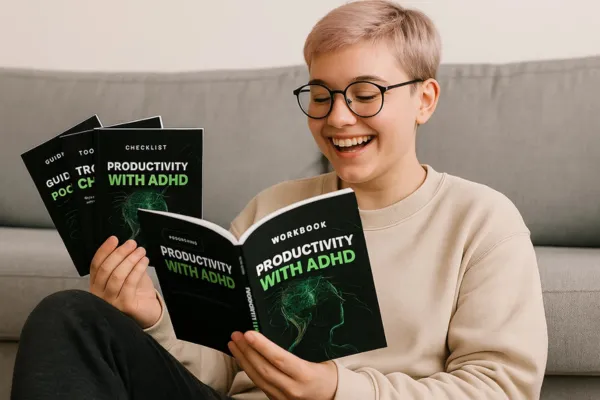
Finding Focus Later in Life: The ADHD Productivity Guide for Adults 55+
Finding Focus Later in Life: The ADHD Productivity Guide for Adults 55+
Are you among the growing number of adults discovering ADHD later in life? You're not alone. Many adults in their 50s, 60s, and beyond are finally putting a name to the challenges they've faced for decades. This guide offers practical productivity strategies specifically designed for your unique situation.
What Does ADHD Look Like in Older Adults?
ADHD doesn't suddenly appear in adulthood – it's been there all along. However, symptoms can manifest differently as we age. For adults 55+, common signs include:
Starting multiple projects but struggling to complete them
Difficulty prioritizing tasks and managing time effectively
Feeling overwhelmed by paperwork and administrative tasks
Challenges with working memory and recall
Impulsive decision-making, particularly with finances
Difficulty maintaining focus during conversations or meetings
According to research from the Journal of Attention Disorders, approximately 3% of adults worldwide have ADHD that persists into older adulthood, though many remain undiagnosed.
Why Are So Many Older Adults Just Now Discovering Their ADHD?
When today's older adults were children, ADHD was poorly understood and rarely diagnosed, especially in girls and academically successful children. Many adults discovering ADHD later in life have spent decades developing coping mechanisms and workarounds without understanding the underlying cause of their challenges.
The National Institute of Mental Health notes that increased awareness, better diagnostic criteria, and more research on adult ADHD have all contributed to the rise in later-life diagnoses.
How Does Late-Diagnosed ADHD Impact Daily Life?
Discovering you have ADHD later in life can trigger a range of emotions – from relief at finally understanding why certain tasks have always been challenging, to grief over lost opportunities. Many adults report reviewing their entire lives through this new lens.
Common impacts include:
Career challenges and underachievement relative to abilities
Financial disorganization and planning difficulties
Relationship strains from forgetfulness or difficulty following through
Low self-esteem from years of negative feedback
Anxiety and depression as secondary conditions
A 2023 study from the International Journal of Environmental Research and Public Health found that late-diagnosed adults often experience significant psychological relief after diagnosis, even before treatment begins.
What Productivity Strategies Actually Work for Older Adults with ADHD?
Traditional productivity advice often fails for people with ADHD because it doesn't account for how our brains work. Here are strategies specifically designed for older adults with ADHD:
1. External Structure Systems
Create external frameworks to compensate for executive function challenges:
Use visual timers to make time concrete
Implement body-doubling (working alongside someone else)
Create accountability partnerships
2. Dopamine-Friendly Task Management
Break large projects into micro-tasks (5-15 minutes each)
Create visual progress trackers
Pair tedious tasks with pleasurable ones (like listening to music)
Schedule tasks during your natural energy peaks
Use the "Pomodoro Technique" with shorter intervals
The ADHD Coaches Organization offers resources specifically for task management strategies that work with your brain's natural chemistry.
3. Environmental Optimization
Create designated spaces for specific activities
Reduce visual clutter that competes for attention
Use color-coding systems
Make important items highly visible
Consider noise-canceling headphones or background sound
Can Medication Help ADHD in Older Adults?
Medication can be effective for adults of all ages, though considerations change as we age. According to the American Journal of Psychiatry, stimulant medications remain the first-line treatment for ADHD across the lifespan, but dosing and monitoring may differ for older adults.
Important considerations include:
Potential interactions with medications for other conditions
Cardiovascular monitoring
Starting with lower doses and titrating slowly
Regular monitoring of benefits and side effects
Always consult with healthcare providers knowledgeable about ADHD across the lifespan, such as those recommended by CHADD (Children and Adults with ADHD).
How Can I Rebuild Self-Confidence After a Late ADHD Diagnosis?
Years of negative feedback and self-criticism often leave emotional scars. Here's how to begin healing:
Learn to separate your worth from your productivity
Practice self-compassion exercises
Connect with peer support groups like ADDA (Attention Deficit Disorder Association)
Reframe past struggles through your new understanding
Celebrate small wins and improvements
Remember that discovering your ADHD is not just about challenges – it's also about recognizing your unique strengths. Adults with ADHD often excel at creative thinking, problem-solving, empathy, and crisis management.
Moving Forward: Creating a ADHD-Friendly Lifestyle in Your Later Years
The best productivity system is one you'll actually use. As you move forward:
Focus on progress, not perfection
Experiment with different strategies to find what works for your unique brain
Be patient with yourself during the learning process
Consider working with an ADHD coach or therapist
Share your diagnosis selectively with supportive people
Remember, you've made it this far with undiagnosed ADHD – that demonstrates remarkable resilience and adaptability. With your new understanding and appropriate supports, imagine what you might accomplish in this next chapter.
